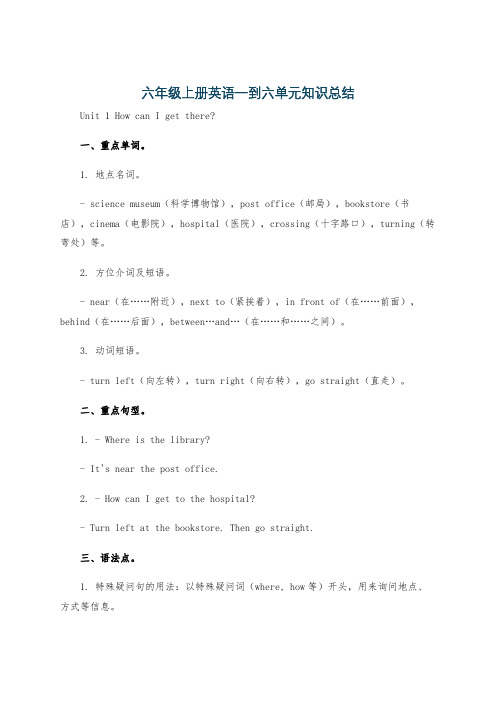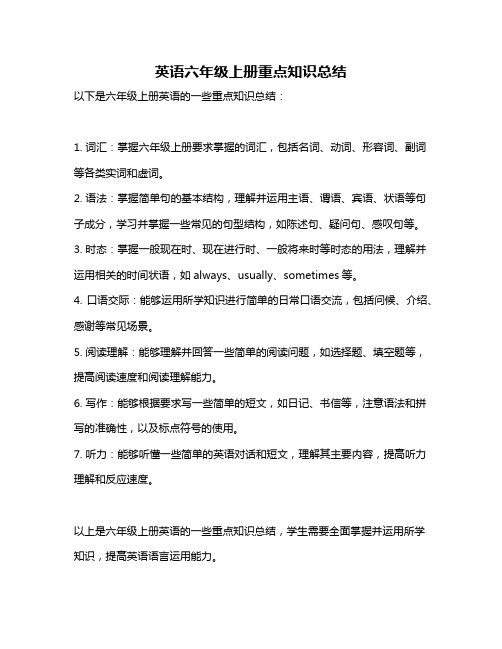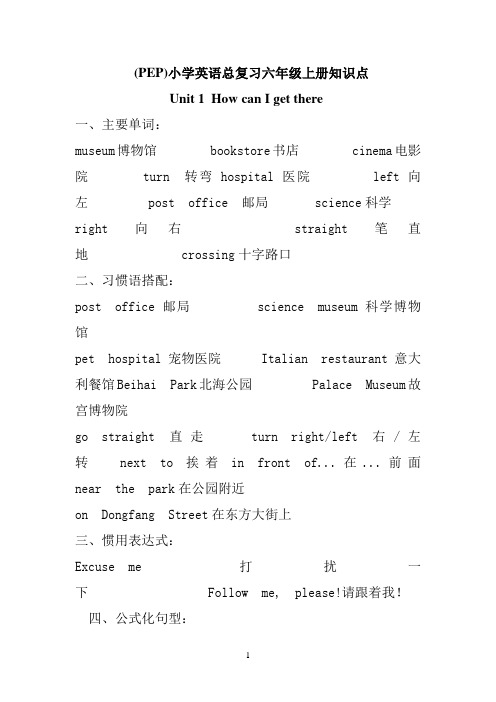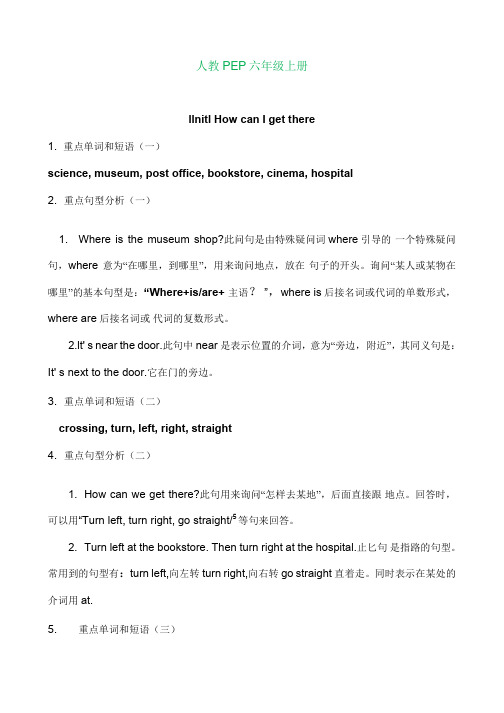六年级上册单词、句型、语法复习
- 格式:docx
- 大小:21.12 KB
- 文档页数:1

六年级第一学期英语知识点总结Unit 1 TV and Radio主要单词及短语:actor 演员actress女演员bad不受欢迎的,坏的best最好的better较好的,更好的Chinese中国的favourite最喜爱的good好的movie电影music音乐off(指电器等)关掉on(电、水等)接通once一次,一回piano钢琴radio收音机singer唱歌的人,歌手snack小吃violin小提琴watch观看Western西方的turn down 关小turn off 关掉turn on打开turn up放大TV show电视文艺节目radio show广播电台,文艺节目主要句子:1、How do you turn it on?/ Let’s turn the radio off. / How do you turn it up? /How do you turn it down?2、What can you play, Li Ming?I can play the piano.Danny is playing the violin.3、What’s your favourite show?I like it best.4、Danny thinks this actor is good.He thinks this actor is better.He thinks this actor is the best actor!5、Do you like this one?I like this one, but it’s not my favourite!6、I like the piano.But I like the guitar better.I like the piano best!7、Who plays best?8、How often does Steven play? Three times a week.9、Let’s listen to the radio, Li Ming.10、Do you like Western music? Yes, I like it, but I like Chinese music better.11、Can you hear it?12、Why is the radio playing Chinese music?13、Thanks for finding this radio show.14、Dinosaurs and people are different. I think dinosaurs and people are the same.15、What did you like best?I liked the dinosaur better than the rabbit, but I liked the snacks best.16、They order some food.17、Jenny wants Western food. “I would like a hamburger, French fries and milk, please.”18、I would like some Chinese food, please. I would like some noodles, dumplings and tea.19、There are many people at the restaurant.20、I can’t hear her. I can’t hear her either.重点语法复习:绝大多数形容词有三种形式,原级,比较级和最高级, 以表示形容词说明的性质在程度上的不同。

六年级上册英语重点单词和句型一、问候与介绍1.Hello! 你好!2.Hi! 嗨!3.Good morning! 早上好!4.Good afternoon! 下午好!5.Nice to meet you! 很高兴认识你!6.My name is…我的名字是…7.What's your name? 你叫什么名字?8.How old are you? 你多大了?二、家庭成员1.This is my family. 这是我的家庭。
2.These are my parents. 这些是我的父母。
3.This is my sister/brother. 这是我的姐姐/哥哥。
4.These are my grandparents. 这些是我的祖父母。
5.This is my aunt/uncle. 这是我的阿姨/叔叔。
6.These are my cousins. 这些是我的堂兄弟姐妹。
三、学校生活1.I'm in Class One/Two/Three. 我在一班/二班/三班。
2.We have a new teacher. 我们有一位新老师。
3.My favorite subject is English/Math/Science/Art/Music/PE. 我最喜欢的科目是英语/数学/科学/美术/音乐/体育。
4.I like reading books in the library. 我在图书馆喜欢读书。
5.After school, I usually play basketball with my friends. 放学后,我通常和我的朋友打篮球。
四、食物与饮品1.What would you like for breakfast/lunch/dinner? 你早餐/午餐/晚餐想吃什么?2.I'd like a sandwich/soup/pizza please. 请给我一份三明治/汤/披萨。

外研版六年级上册m1-m10重点短语、句型、语法归纳一、重点短语1.M1:-be from=come from-in the east/west/north/south of China-be famous for-lots of=a lot of2.M2:-play football/basketball/ping-pong-go swimming/shopping/cycling-do one's homework-on Saturday morning-last Sunday3.M3:-like doing something-want to do something-be good at doing something-be interested in doing something-learn to do something4.M4:-be going to do something-have a party-buy some presents-make some food-do some shopping5.M5:-there is/are-have got-would like to do something-show someone around-live in6.M6:-How long does it take to do something?-It takes someone some time to do something. -How far is it from A to B?-It's about...kilometers away.7.M7:-be different from-in the past-change a lot-keep healthy/fit-be good for8.M8:-be made of-be used for-be made in-be famous for-be known as9.M9:-prefer doing something to doing something -would rather do something than do something -as soon as possible-get ready for-prepare for10.M10:-wish to do something-hope to do something-plan to do something-decide to do something-try to do something二、重点句型1.M1:-Where are you from?-I'm from China.-What are you famous for?-We're famous for our beautiful mountains.2.M2:-What do you usually do on Saturday morning? -I usually play basketball.-What did you do last Sunday?-I went shopping.3.M3:-I like playing basketball.-She wants to learn to dance.-He is good at drawing.-They are interested in learning English.4.M4:-We are going to have a party next week.-I am going to buy some presents for my friends. -They are going to make some food for the party.5.M5:-There is a park near my home.-I have got a new bicycle.-Would you like to come to my party?-Can you show me the way to the museum?6.M6:-How long does it take to walk to school?-It takes me about30minutes to walk to school. -How far is it from your home to school?-It's about2kilometers away.7.M7:-Life in the past was very different from life today.-Things have changed a lot in the last few years. -We should keep healthy and fit.-Eating vegetables is good for our health.8.M8:-Pavilions are usually made of wood.-Chopsticks are used for eating rice.-This car is made in Japan.-China is famous for its tea.9.M9:-I prefer playing basketball to playing football. -I would rather stay at home than go out.-Please send the email as soon as possible.-We are getting ready for the English test.10.M10:-I wish to travel around the world.-She hopes to become a doctor in the future. -They plan to visit their grandparents tomorrow. -He decided to give up smoking.-She tries to finish her homework every day.三、语法归纳1.一般现在时:表示经常发生的动作或现在的状态。

PEP六年级上册复习一(词汇)四会单词(听说读写)Unit 1:by (经……,乘……) foot(脚) bike(自行车) bus(公共汽车) train(火车) how(怎样) go to school(上学)traffic(交通) traffic light(交通灯) traffic rule(交通规则)stop(停;停车站)wait (等;等待)get to(到达)by plane(乘飞机) by ship(乘轮船) by subway(乘地铁)Unit 2:library(图书馆) post office(邮局) hospital(医院) cinema(电影院) bookstore(书店)turn(转弯) then(然后) where(在哪里,到哪里) please(请) next to(与……相邻) turn right (向右转) turn left(向左转) go straight(笔直走) north(北) south(南) east(东) west(西)Unit 3:next week(下周) this morning(今天上午) this afternoon(今天下午) this evening (今天晚上) comic book(漫画书) post card(明信片) newspaper(报纸) buy(购买)Unit 4:hobby(爱好) ride a bike—riding a bike(骑自行车) play the violin—playing the violin(拉小提琴) dive —diving(跳水) make kites—making kites(制作风筝) collect stamps—collecting stamps(集邮) live—lives(居住) teach—teaches(教) go—goes(去) watch—watches(看) read—reads(读,看) does(助动词,无义) doesn’t=does notUnit 5:singer(歌唱家,歌手) writer(作家) actor(男演员) actress(女演员) artist(画家)TV reporter(电视台记者) engineer(工程师) accountant(会计) salesperson(销售员)policeman(男警察) cleaner(清洁工) where(在哪里;到哪里) work(工作)Unit 6:rain(雨;下雨) cloud (云;云彩) sun(太阳) stream((小)河;(小)溪) come from(来自……;从……来) seed(种子) soil(土壤) sprout (苗;芽;嫩芽) plant(植物;种植) should (应该) then(然后)三会单词(听说读)a pair of(一双)always(总是;一直)dictionary(词典;字典)magazine(杂志)tomorrow(明天)excuse me (对不起)fun (快乐;乐趣)go to the cinema(去看电影)look(看上去)month(月份;月)read a magazine(阅读杂志)science museum (科学博物馆)shoe store(鞋店)show(展览;演出;表演;节目)take(乘坐)take a trip(去旅行)tell(告诉)tonight(今晚)vapour(蒸汽;水汽)want(想要)with (同……;和……)know(知道)minute (分钟)again(再一次;又;再)PEP六年级上册复习二(句型)四会句型(听说读写)Unit 1How do you go to school, Sarah? Sarah 你怎么去学校?Usually I go to school on foot. 通常我步行去。

六年级上册英语一到六单元知识总结Unit 1 How can I get there?一、重点单词。
1. 地点名词。
- science museum(科学博物馆),post office(邮局),bookstore(书店),cinema(电影院),hospital(医院),crossing(十字路口),turning(转弯处)等。
2. 方位介词及短语。
- near(在……附近),next to(紧挨着),in front of(在……前面),behind(在……后面),between…and…(在……和……之间)。
3. 动词短语。
- turn left(向左转),turn right(向右转),go straight(直走)。
二、重点句型。
1. - Where is the library?- It's near the post office.2. - How can I get to the hospital?- Turn left at the bookstore. Then go straight.三、语法点。
1. 特殊疑问句的用法:以特殊疑问词(where, how等)开头,用来询问地点、方式等信息。
2. 一般现在时在问路指路中的运用。
Unit 2 Ways to go to school.一、重点单词。
1. 交通工具名词。
- by bike(骑自行车),by bus(乘公共汽车),by train(乘火车),by plane(乘飞机),on foot(步行),ship(轮船),subway(地铁)等。
2. 形容词。
- slow(慢的),fast(快的)。
3. 其他。
- traffic(交通),traffic lights(交通灯),stop(停),wait(等)。
二、重点句型。
1. - How do you come to school?- Usually, I come on foot.2. - How can I get to the Fuxing Hospital?- Take the No. 57 bus over there.三、语法点。

英语六年级上册重点知识总结
以下是六年级上册英语的一些重点知识总结:
1. 词汇:掌握六年级上册要求掌握的词汇,包括名词、动词、形容词、副词等各类实词和虚词。
2. 语法:掌握简单句的基本结构,理解并运用主语、谓语、宾语、状语等句子成分,学习并掌握一些常见的句型结构,如陈述句、疑问句、感叹句等。
3. 时态:掌握一般现在时、现在进行时、一般将来时等时态的用法,理解并运用相关的时间状语,如always、usually、sometimes等。
4. 口语交际:能够运用所学知识进行简单的日常口语交流,包括问候、介绍、感谢等常见场景。
5. 阅读理解:能够理解并回答一些简单的阅读问题,如选择题、填空题等,提高阅读速度和阅读理解能力。
6. 写作:能够根据要求写一些简单的短文,如日记、书信等,注意语法和拼写的准确性,以及标点符号的使用。
7. 听力:能够听懂一些简单的英语对话和短文,理解其主要内容,提高听力理解和反应速度。
以上是六年级上册英语的一些重点知识总结,学生需要全面掌握并运用所学知识,提高英语语言运用能力。

六年级上册英语复资料以下是六年级上册英语复习资料,包括一些重点词汇、短语和句子,以及一些常见的语法知识点。
重点词汇:1. subject 科目2. math 数学3. science 科学4. social studies 社会研究5. English 英语6. Chinese 语文7. music 音乐8. art 美术9. physical education 体育10. library 图书馆常见短语:1. have a good day 过得愉快2. see you later 待会儿见3. have a good time 过得开心4. let me know 让我知道5. have a look 看一看6. have a seat 请坐7. what about you 你呢8. I don’t know 我不知道9. I think so 我认为如此10. I’m not sure 我不能确定常见句子:1. What’s your favorite subject? 你最喜欢的科目是什么?2. I like math because it’s fun. 我喜欢数学因为它很有趣。
3. Do you like science? 你喜欢科学吗?4. Yes, I do. 是的,我喜欢。
5. No, I don’t. 不,我不喜欢。
6. What’s your favorite sport? 你最喜欢的运动是什么?7. My favorite sport is basketball. 我最喜欢的运动是篮球。
8. When do you usually get up? 你通常什么时候起床?9. I usually g et up at 7 o’clock. 我通常在7点钟起床。
10. How many hours do you sleep every night? 你每晚睡多少小时?语法知识点:1. 现在进行时:表示正在进行的动作或状态,结构为“be动词+动词ing”。

PEP初中英语六年级上册知识点归纳一、语法篇1. Be动词:是,am,are,was,were,been。
2. 疑问词:what,where,when,why,how,who。
3. 情态动词:can,could,may,might,should,must。
4. 祈使句:动词原形。
5. 一般现在时:主语+V(原形)+其他。
6. 现在进行时:主语+be+V(ing)+其他。
7. 一般过去时:主语+V(过去式)+其他。
8. 过去进行时:主语+was/were+V(ing)+其他。
9. 将来时:主语+will/shall+V(原形)+其他。
10. 过去将来时:主语+would/should+V(原形)+其他。
二、词汇篇1. 人称代词:I,you,he,she,it,we,they。
2. 物主代词:my,your,his,her,its,our,their。
3. 形容词:big,small,long,short,tall,fat,thin,heavy,light,old,young。
4. 副词:often,seldom,always,never,sometimes,very,too,so,quite。
5. 数词:序数词(first,second,third)和基数词(one,two,three)。
6. 时间词:week,month,year,morning,afternoon,evening,night。
7. 颜色词:red,green,blue,yellow,white,black。
8. 动词:play,listen,watch,read,write,swim,dance,sing,draw,speak。
9. 名词:book,desk,chair,table,bed,door,window,picture,pen,ruler,bottle,bag,pencil case。
三、对话篇3. Talking about family: How many people are there in your family? What do your parents do?4. Talking about hobbies: Do you like…? What’s your favourite…?5. Talking about school: What subjects do you study at school? Who’s your favourite teacher?6. Talking about daily routines: What time do you get up/go to bed? What do you do on weekends?希望以上知识点归纳对您有所帮助。

六年级上册英语一到四单元知识点一、第一单元:Welcome to our school词汇:掌握学校设施、教室物品、学科名称等词汇,如library、playground、computer room、math、science等。
句型:学会使用简单的问候语和介绍句型,如“Hello! I’m…”、“Welcome to our school!”和“This is our…”。
语法:初步了解一般现在时的基本用法,如“I am a student.”和“She is a teacher.”等。
二、第二单元:What’s your favorite subject?词汇:掌握学科名称、课程名称等词汇,如math、science、art、music等。
句型:学会询问和回答关于学科和课程的问题,如“What’s your favorite subject?”和“I like math.”等。
语法:进一步了解一般现在时的基本用法,如“They have three math classes every week.”等。
三、第三单元:My weekend plan词汇:掌握关于周末活动的词汇,如watch TV、read books、play sports等。
句型:学会使用“I’m going to…”句型来表达自己的周末计划,如“I’m going to watch TV this weekend.”等。
语法:了解一般将来时的基本用法,如“She is going to play basketball tomorrow.”等。
四、第四单元:My new friend词汇:掌握关于人物外貌、性格特点的词汇,如tall、short、funny等。
句型:学会使用“He/She is…”句型来描述他人的外貌和性格特点,如“He is tall and funny.”等。
语法:了解一般现在时中第三人称单数形式的基本用法,如“He likes playing basketball.”等。

(PEP)小学英语总复习六年级上册知识点Unit 1 How can I get there一、主要单词:museum博物馆bookstore书店cinema电影院turn 转弯hospital医院left向左post office 邮局science科学right向右straight笔直地crossing十字路口二、习惯语搭配:post office邮局science museum科学博物馆pet hospital宠物医院Italian restaurant意大利餐馆Beihai Park北海公园 Palace Museum故宫博物院go straight直走turn right/left右/左转next to挨着in front of...在...前面near the park在公园附近on Dongfang Street在东方大街上三、惯用表达式:Excuse me 打扰一下Follow me, please!请跟着我!四、公式化句型:1、问路的句型及其答语:问句:Where is the + 地点······在哪儿答语:It's + 表示地点的词语(next to the bookstore,near the hospital/post office, over there,on Dongfang Street, infront of the school... )2、询问怎么到某地的句型及其答语:问句:How can +主语+ get (to)+地点·····怎么到·····同义句型:Can you tell me the way to +地点Where is + 地点Which is the way to +地点五、例句:Where is the cinema, please 请问电影院在哪里It's next to the hospital.它与医院相邻。

六年级英语上册重点单词句型语法复习资料小学英语语法学习还处在基础积累阶段,所以这段时期的学习积累是很重要的,下面是小编给大家带来的六年级英语上册重点单词句型语法复习资料,希望能够帮助到大家!六年级英语上册重点单词句型语法复习资料Unit 1 How can I get there? 我怎样到达那里。
重点单词science museum 科学博物馆, post office 邮局, bookstore书店, cinema电影院, hospital 医院, crossing 十字路口, turn left 左转, turn right 右转, go straight 直走, map 地图, compass指南针, GPS 全球定位系统, stars 星星, Italian restaurant 意大利餐厅, get to 到达。
重点句型1. ---Where is the restaurant? 餐厅在哪里?----It’s next to t he park on Dong fang Street. 它在东方路,在公园附近。
2.---How can we get there? 我们怎么去哪里?----Turn left at the bookstore. Then turn right at the hospital.书店左转,然后医院右转。
3. He now has GPS. 他现在有GPS。
4. What an interesting film! 多么有趣的电影!方位词复习:next to紧挨着, near在...附近, behind在...后面, beside在...旁边, in front of在...前面。
Unit 2 Ways to go to school. 上学的方式。
重点单词on foot 走路, by bike骑车, by bus 乘公交, by train 乘火车, by subway乘地铁, by ship 乘船, by plane 乘飞机, slow down 慢下来, traffic lights 交通灯, traffic rules 交通规则, go/come to school 上学, by sled 坐雪橇, by ferry坐轮渡, pay attention to 注意, trafficlights交通灯, Stop and wait at a red light 红灯停等一等, slow down and stop at a yellow light 黄灯减速并停下, Go at a green light 绿灯行。

人教PEP六年级上册llnitl How can I get there1. 重点单词和短语(一)science, museum, post office, bookstore, cinema, hospital2. 重点句型分析(一)1. Where is the museum shop?此问句是由特殊疑问词where引导的一个特殊疑问句,where意为“在哪里,到哪里”,用来询问地点,放在句子的开头。
询问“某人或某物在哪里”的基本句型是:“Where+is/are+ 主语?”,where is后接名词或代词的单数形式,where are后接名词或代词的复数形式。
2.lt' s near the door.此句中near是表示位置的介词,意为“旁边,附近”,其同义句是:It' s next to the door.它在门的旁边。
3. 重点单词和短语(二)crossing, turn, left, right, straight4. 重点句型分析(二)1. How can we get there?此句用来询问“怎样去某地”,后面直接跟地点。
回答时,可以用“Turn left, turn right, go straight/5等句来回答。
2. Turn left at the bookstore. Then turn right at the hospital.止匕句是指路的句型。
常用到的句型有:turn left,向左转turn right,向右转go straight直着走。
同时表示在某处的介词用at.5. 重点单词和短语(三)Tasty, buy, London Eye, next to, far from, go straight, turn left, stomach 6. 重点句型分析(三)Is the Thames far from here? No.此句是个be动词开头的一般疑问句,其回答要用yes或no.句中的far from意为“离 ............................................. 远”。

六年级上册英语第六单元知识点笔记目录1. 词汇2. 语法3. 句型4. 阅读理解一、词汇1. 家庭成员- father 父亲- mother 母亲- brother 兄弟- sister 姐妹- grandmother 祖母- grandfather 祖父2. 家居用品- sofa 沙发- table 桌子- ch本人r 椅子- bed 床- lamp 灯3. 衣服- dress 裙子- shirt 衬衫- pants 裤子 - shoes 鞋子 - hat 帽子二、语法1. 物主代词- my 我的- your 你的- his 他的- her 她的- its 它的- our 我们的 - your 你们的 - their 他们的2. 短语动词- clean up 收拾- put on 穿上- take off 脱下- look after 照顾- get up 起床3. 连词- and 和- but 但是- or 或者- so 所以- because 因为三、句型1. 对于家庭成员的描述- This is my father. 这是我的父亲。
- She is my grandmother. 她是我的祖母。
- They are my brothers. 他们是我的兄弟。
2. 表达喜好的句型- I like playing basketball. 我喜欢打篮球。
- He likes reading books. 他喜欢读书。
- She doesn't like dancing. 她不喜欢跳舞。
3. 对物品的描述- The sofa is big. 这个沙发很大。
- The lamp is on the table. 灯放在桌子上。
- My hat is red. 我的帽子是红色的。
四、阅读理解1. 阅读理解题目- 根据所给的家庭成员和家居用品,回答相关问题。
- 例题:Who is the boy in the picture?(这张图片中的男孩是谁?)- 答案:He is my brother.(他是我的兄弟。

一、英语六年级上册知识点:1、四会单词:meet, warm, spring, summer, autumn, cool, winter, sky, weather, kind, surprise, today, tomorrow, answer, chance, good, want, agree, sorry, face, feel, anyway, pass, loud, group, thank, happened, decide2、六会单词:interested, interesting, polite, politeness, surprised, surprising, patient, patience, excited, exciting3、词组:at once, on weekend, look like, answer the question, have a try, have a look, have a chat, be sorry to, be kind to, not at all, be lucky to, say sorry, make a phone call, what a surprise, make a plan4、重点句型:1) What's the weather like today?2) It's warm/cool/ windy/sunny.3) What season do you like best?4) I like spring/summer/autumn/winter best.5) Shall we go out?7) I'm sorry to hear that.9) I'd love to.10) I agree with you.11) I disagree with you.12) What happened?13) Would you like to join us?14) I'm sorry, I can't.15) I'd like to have a try.16) It sounds exciting.17) What a surprise!18) Let's decide together.19) Let's make a plan.20) Shall we have a chat?二、六年级上册语法知识:1、紧缩形式:I'm = I amShe's = She isHe's = He isYou're = You are2、疑问句:Shall we go? 咱们去吗?Would you like to join us? 你想加入我们吗?What's the weather like today? 今天天气怎么样?What season do you like best? 你最喜欢哪个季节?3、情态动词:Can 能;可以Must 必须Mustn't 不可以Should 应该Shouldn't 不该4、动词的时态:一般现在时:表示动作发生的经常性或习惯一般过去时:表示动作已经发生以及有的结果5、There be 句型:There is a lake in the park. 公园里有一个湖There are many flowers in the garden. 花园里有许多花6、代词:I我You 你,你们He他She 她It它We我们They 他们7、祈使句:Let's go! 咱们走吧!Let's make a plan. 咱们来制定一个计划吧。

六年级英语上册第一单元的必背知识点一、重点单词及短语1.交通工具类:by plane(坐飞机)、by ship(坐轮船)、on foot(步行)、by bike(骑自行车)、by bus(坐公共汽车)、by train(坐火车)、subway(地铁)。
2.交通设施类:traffic lights(交通灯)、traffic rules(交通规则)、stop(停)、wait(等待)、remember(记住)、get to(到达)、find(找到)。
3.地点类:museum(博物馆)、bookstore(书店)、cinema (电影院)、hospital(医院)、post office(邮局)、science museum (科学博物馆)、Italian restaurant(意大利餐馆)、pet hospital (宠物医院)等。
4.其他常用短语:go to school(去上学)、get on(上车)、get off(下车)、turn left(左转)、turn right(右转)、go straight (直走)等。
二、重要句型及表达式1.问路句型:Where is the + 地点?(...在哪里?)How can I get to the + 地点?(我怎样才能到达...?)Can you help me?(你能帮我吗?)2.回答句型:It's next to/near/on the left/right of...(它在...旁边/附近/左边/右边)You can go by...(你可以坐...去)Go along this street and turn left/right at the first crossing.(沿着这条街走,在第一个十字路口左转/右转)3.其他常用表达式:Follow me, please!(请跟着我!)Excuse me.(打扰一下)Thank you.(谢谢)See you.(再见)三、语法点1.频度副词:always(总是)、usually(通常)、often(经常)、sometimes(有时候)、never(从来不)。

1.Where 在哪里?----回答地点。
Where is the museum shop? 博物馆商店在哪里? -- It’s near the door. 在门的旁边。
Where is the post office? 邮局在哪里? --It’s next to the bookstore. 在书店旁边。
Where are you going this weekend ? 这个周末你打算去哪里?--I’m going to the cinema. 我打算去电影院。
Where is Amy going this weekend ? 这个周末Amy打算去哪里?--She is going to the supermarket. 她打算去超市。
Where does he work? 他在哪里工作? --He works at sea. 他在海边工作。
Where does your mother work? 你妈妈在哪里上班?--She works in a factory.2. Wha t 什么?----打算干什么?爱好是什么?职业是什么?What are you going to do today? 你今天要做什么?--I’m going to see a film. What is Amy going to do this weekend? Amy这周末要做什么? (Wha t提问干什么) She is going to visit her grandparents. 她要去拜访她的爷爷奶奶。
单数:What is your hobby? 你的爱好是什么? -I like swimming. 我喜欢游泳。
复数:What are your hobb ies ?你的爱好是什么? -I like reading stories.我喜欢阅读。
What are her hobbies? 她的爱好是什么? -She like s singing and dancing.What are his hobbies? 他的爱好是什么?-He like s playing football.What are Peter’s hobbies? --He like s going hiking. 他喜欢去远足。

人教版小学六年级英语上册知识点总结和复习要点一、词汇积累与应用1基本词汇熟练掌握课本中出现的各类基本词汇,如名词、动词、形容词、副词等。
特别注意动词的过去式、现在分词和第三人称单数形式的变化。
例子:名词:festival(节日)、tradition(传统)、present(礼物)动词:visit(拜访)、celebrate(庆祝)、travel(旅行)形容词:happy(快乐的)、special(特别的)、interesting (有趣的)2短语与固定搭配记忆并理解课本中常用的短语和固定搭配,能够正确运用到句子中。
例子:短语:have a good time(玩得开心)、make a snowman (堆雪人)、be interested in(对……感兴趣)二、句型结构与语法1陈述句复习并巩固陈述句的基本结构,能够正确构建和表达完整的句子。
例子:陈述句:I like playing football in the afternoon.(我喜欢下午踢足球。
)2疑问句学习和掌握特殊疑问句、一般疑问句及其回答方式,能够准确理解并回答问题。
例子:特殊疑问句:What do you usually do on your birthday?(你生日通常做什么?)回答:I usually have a birthday party with my friends.(我通常和朋友们一起举办生日派对。
)3祈使句巩固祈使句的基本用法,能够正确使用祈使句表达请求、命令或建议。
例子:祈使句:Please don’t forget to bring your homework tomorrow.(请别忘了明天带作业来。
)4时态复习并巩固一般现在时、一般过去时、一般将来时和现在进行时等时态的基本用法和形式。
例子:一般现在时:She often reads books after dinner.(她晚饭后经常看书。
)一般过去时:We went to the zoo last weekend and saw many animals.(我们上周末去了动物园,看到了很多动物。

六年级上册第一单元语法一、核心词汇1. 名词: science 科学museum 博物馆bookstore 书店cinema 电影院hospital 医院crossing 十字路口2. 动词: turn 转弯3. 副词: left 左right 右straight 笔直地4. 短语: post office 邮局二、了解词汇1. 名词: sir 先生restaurant 餐馆pizza 比萨饼street 大街;街道GPS 全球(卫星)定位系统feature 特点2. 动词: ask 问get 到达gave(give的过去式) 提供;交给follow 跟着tell 告诉3. 形容词: interesting 有趣的Italian 意大利的far 较远的三、核心句型1. —Where is the cinema? 电影院在哪儿?—It’s next to the bookstore. 紧挨着书店。
2. How can we get there?我们怎么到那儿?3. Turn left at the bookstore. Then turn right at the hospital.到书店左转。
然后到医院右转。
注意:要注意介词的固定搭配。
Turn left/right at the …到……左/右转。
Get off at the …在……下车。
It’s on the left/right.在左/右边。
Walk/Go straight for …minutes.步行/直走……分钟。
It’s east/west/south/north of the …在……东/西/南/北边。
It’s far from the …距离……远。
四、了解句型1. Is there a …? ……有……吗?拓展: there be句型(1)主要用以表达“某处(某时)有某人(某物)”,其基本句型为“There+be 动词+名词+介词短语+其他.”There is a football under the chair. 椅子下面有一个足球。

外研社三起点六年级上册单词及短语总结三、单词及短语1、短语:、look at“看”、in the east of China“在中国的东部”、every day“每天”2、短语:send sb an email=send an email to sb“给某人发电子邮件”want to do sth“想要做某事”、the Huangshan Mountain“黄山”the Changjiang River“长江”、a postcard from…“来自…的一张明信片”too late“太晚了”3、短语:another Chinese stamp“另一张中国邮票”、toy dog“玩具狗”、What about you?“你呢?”、picture books“图画书”、fly kites“放风筝”、ride my bicycle“骑自行车”、take pictures“拍照”4、短语:on Thanksgiving Day“在感恩节”at Christmas“在圣诞节”at the Mid-Autumn Festival“在中秋节”、on this day“在这天”、fly the flag“使旗飘扬”sing songs“唱歌”、have a meal“吃一顿饭”、a big family dinner“一次大的家庭聚餐”the dragon boat race“龙舟比赛”、hang lanterns“挂灯笼”、do dragon dances“舞龙”songs about the moon“关于月亮的歌曲”a special day for Chinese people“对于中国人特殊的一天”、in winter/autumn“在冬季/秋季”have lots of fun“玩得很开心”、look at“看”、look for“寻找”、moon cake“月饼”5、短语:from the UK“来自英国”、write to your friends“给你的朋友写信”、pen friend“笔友”6、短语:live in New York“住在纽约”、next year“明年”、a knife and fork“一套刀叉”in the north“在北方”、have classes“上课”7、短语:for twelve hours a day“一天持续12小时”、come out of“从…中出来”a photo of my family“一张我家庭的照片”、in winter“在冬季”8、短语:long ago=a long time ago“很久以前”、read stories“读故事”clean your room“打扫你的房间”、take photos of sb“给某人拍照”、watch films“看电影”speak English“讲英语”、play computer games“玩电脑游戏”、help your mum“帮助你的妈妈”、eat fast food“吃快餐”、ride my bike to school“骑自行车去学校”go to school by bus“乘公交去上学”、eat with a knife and fork“用刀叉吃饭”write stories in English“用英语写故事”、go swimming“去游泳”、cook dinner“做晚餐”do my homework“做作业”、send emails“发邮件”、go to the doctor“去看医生”collect stamps“集邮”9、短语:want to do sth“想要做某事”、the flag of China“中国国旗”all around the world“遍及全世界”、go inside“去里面”、give sth to sb=give sb sth“把某物给某人”、fly to China“飞到中国”、all these places“所有这些地方”、member state“成员国”10、短语:stand in line“排队”、twenty to five“差20分钟到5点”、close at five“5点关门”go straight on“直走”、turn left“向左转”、stand up“起立”、sit down“坐下”be late for school“上学迟到”外研社三起点六年级上册交际用语总结一、交际用语1、Pleased to meet you!“很高兴认识你!”=Nice to meet you!2、I don’t believe it!“我不相信!”3、I’d love to.“我愿意。
PEP六年级上册单词Unit 1:by (经……,乘……) foot(脚) bike(自行车) bus(公共汽车) train(火车) how(怎样) go to school(上学)traffic(交通) traffic light(交通灯) traffic rule(交通规则)stop(停;停车站)wait(等;等待)get to(到达)by plane(乘飞机) by ship(乘轮船) by subway(乘地铁) Unit 2:library(图书馆) post office(邮局) hospital(医院) cinema(电影院) bookstore (书店)turn(转弯) then(然后) where(在哪里,到哪里) please(请) next to(与……相邻) turn right (向右转) turn left(向左转) go straight(笔直走) north(北) south(南) east(东) west(西)Unit 3:next week(下周) this morning(今天上午) this afternoon(今天下午) this evening (今天晚上) comic book(漫画书) post card(明信片) newspaper(报纸) buy(购买)Unit 4:hobby(爱好) ride a bike—riding a bike(骑自行车) play the violin—playing the violin(拉小提琴) dive—diving(跳水) make kites—making kites(制作风筝) collect stamps—collecting stamps(集邮) live—lives(居住) teach—teaches(教) go—goes(去) watch—watches(看) read—reads(读,看) does(助动词,无义) doesn’t=does not Unit 5:singer(歌唱家,歌手) writer(作家) actor(男演员) actress(女演员) artist(画家) TV reporter(电视台记者) engineer(工程师) accountant(会计) salesperson(销售员) policeman(男警察) cleaner(清洁工) where(在哪里;到哪里) work(工作)Unit 6:rain(雨;下雨) cloud (云;云彩) sun(太阳) stream((小)河;(小)溪) come from(来自……;从……来) seed(种子) soil(土壤) sprout (苗;芽;嫩芽) plant(植物;种植) should (应该) then(然后) a pair of(一双)always(总是;一直)dictionary(词典;字典)magazine(杂志)tomorrow(明天)excuse me (对不起)fun(快乐;乐趣)go to the cinema(去看电影)look(看上去)month(月份;月)read a magazine (阅读杂志)science museum(科学博物馆)shoe store(鞋店)show(展览;演出;表演;节目)take(乘坐)take a trip(去旅行)tell(告诉)tonight (今晚)vapour(蒸汽;水汽)want(想要)with(同……;和……)know (知道)minute(分钟)again(再一次;又;再)PEP六年级上册句型Unit 1How do you go to school, Sarah?Usually I go to school on foot.Sometimes I go by bike.How can I get to Zhongshan Park?You can go by the No.15 bus.Unit 2Where is the cinema, please? It’s next to the hospital. Turn left at the cinema, then go straight. It’s on the left. Unit 3What are you going to do on the weekend?I’m going to visit my grandparents this weekend. Where are you going this afternoon? I’m going to the bookstore. What are you going to buy? I am going to buy a comic book. Unit 4What’s your hobby? I like collecting stamps. He likes collecting stamps, too.Does she teach English? No, she doesn’t. Does she teach you math? Yes, she does. Unit 5What does your mother do? She is a TV reporter. Where does she work? She works in a school. How does she go to work? She goes to work by bus. Unit 6Where does the rain come from? It comes from the clouds. How do you do that?What should you do then?1. My home is near.2.What about you?3.Look at the traffic lights.4.Remember the traffic rules.5.Stop at a red light.6.Wait at a yellow light.7.Go at a green light.8.Can I go on foot? Sure, if you like. It’s not far.9.Where is the …? It’s near the…10.Excuse me, is there a … near here? Yes, there is.11.Is it far from here? No, it’s not far.12.–Thank you. –You’re welcome.13.Where is the …?It’s east/west/south/north of the14.When are you going? I am going at 3 o’clock.15.Can he go with us? Sure.16.Let’s go together.17.There is a stamp show on Sunday.18.She is a teacher. She teaches math.19.Does your pen pal live in Shanghai? No, he doesn’t.20.Where does she work? She works in a car company.21.How does she go to work? She goes to work by bus.22.Where does the … come from? It comes from the …23.How can the water become vapour?The sun shines and the water becomes vapour.24.How do you do that? First, put the seeds in the soil25.It’s easy.26.What should you do then?Water them. In several days, you can see a sprout.27.First, …Then, …Next, …At last, …PEP六年级上册语法一、现在进行时态(3种变化规律)1. 直接加ing:do—doing draw—drawing cook—cooking answer—answering read—reading listen—listening fly—flying sing—singing play—playing2. 去掉末尾的e加ing:write—writing ride—riding dance—dancingtake—taking have—having make—making3. 双写末尾字母加ing:get—getting run—running swim—swimming sit—sittinglike后面的动词要加上ing二、一般将来时态(be going to/will + 动词原形)表示一般将来时的时间状语有:this morning, this afternoon, this evening, tomorrow, tonight, this weekend, on the weekend, next week, next month, next year, next weekend.(今晚)你将要做什么?What are you going to do (this evening)?I’m going to the cinema.I’m going to visit my grandparents.三、第三人称单数后面的动词要加s或es1. 一般情况加s,如:read—reads;live—lives;play—plays;2. 动词末尾以s,o,x,ch,sh结尾的加es。
(记住课本中出现的这几个:watch es, teach es, go es, do es, wash es, pass es)3. 辅音字母+y结尾的把y变i再加es,如:fly—flies;study—studies4. 特殊情况:have--has5. 第三人称单数包括:he; she; it; my father/friend; Amy/Hangzhou等一个人名或地名。
例如:He likes drawing pictures.She works in a car company.It comes from the clouds.My father goes to work on foot.Li Lei often plays computer games after lunch.6. 一般疑问句记住:前面助动词加了es,后面动词就不变化了。